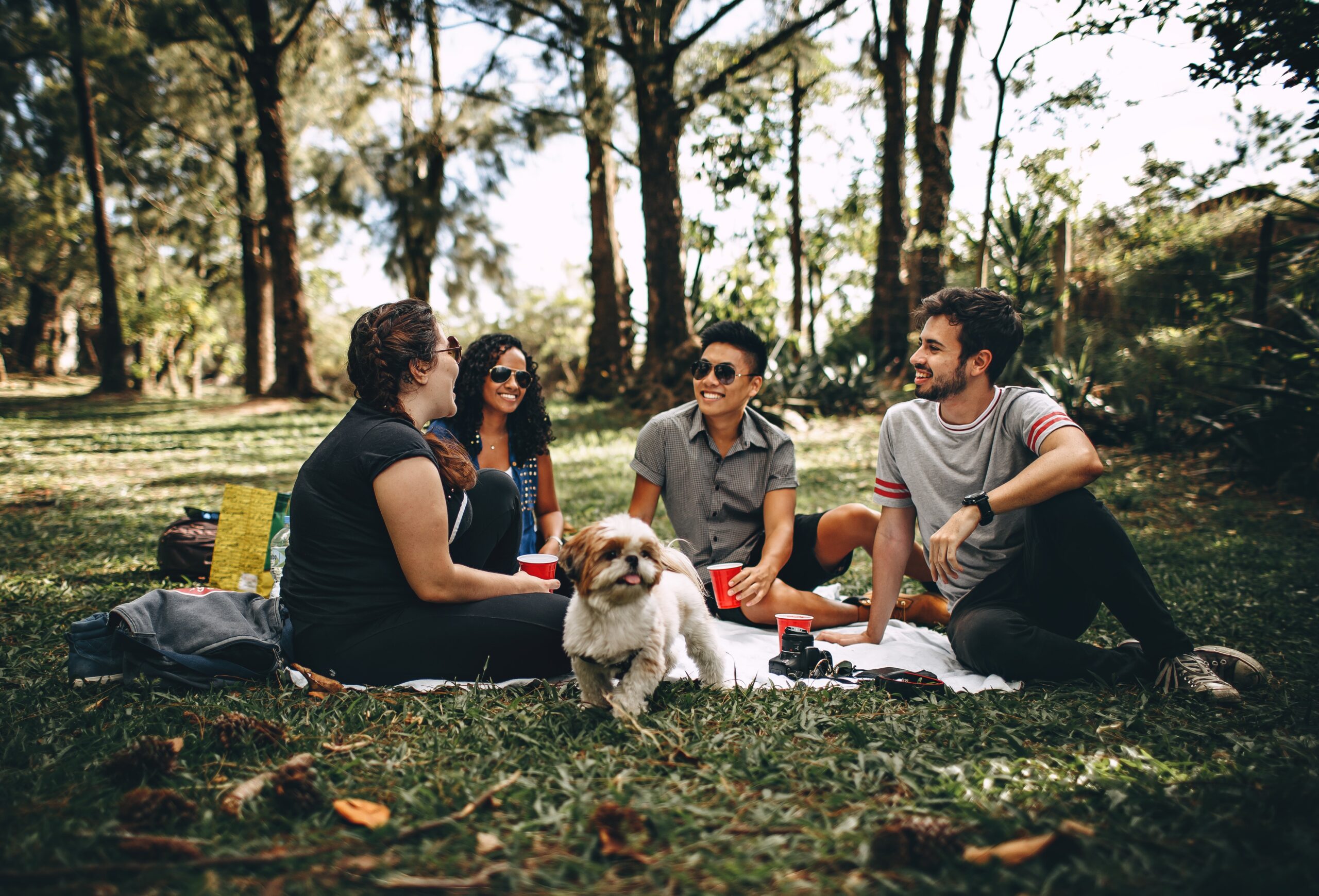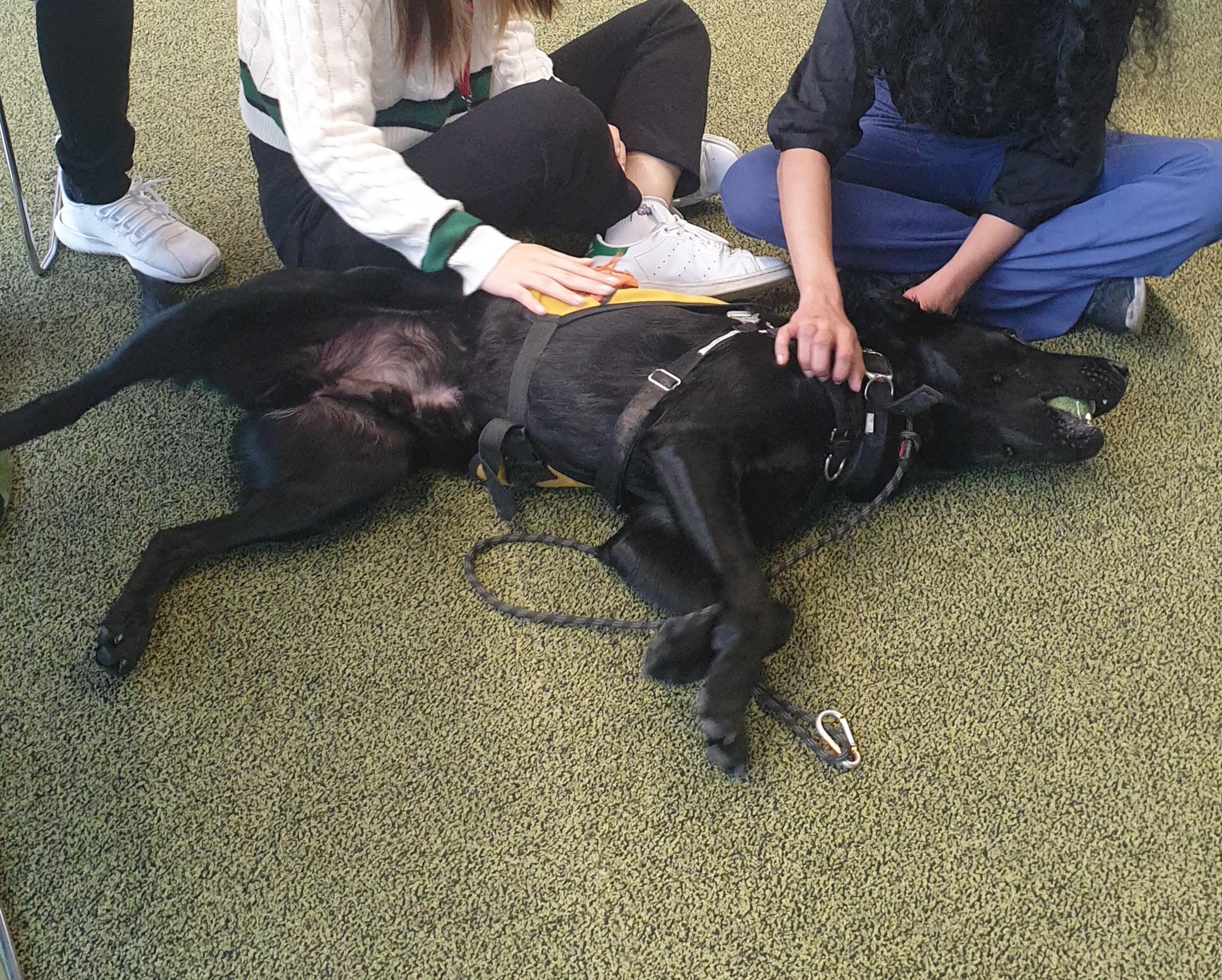Fostering Belonging and Connection (Section 2)
Case Study 1: Puppies lend a paw to support student and staff wellbeing at La Trobe College Australia

When Victoria’s long-lasting Covid-19 lockdowns ended, staff at La Trobe College Australia (LTCA) in Melbourne observed that a significant number of students did not readily return to on-campus learning. With social integration and a sense of institutional belonging acting as key drivers of student engagement, success, persistence, and retention, academic and student support staff sought to create greater incentives for students to return to the classroom. A range of wellbeing and belonging initiatives were employed, including a partnership with the Centre for Service and Therapy Dogs Australia (CSTDA), which brought mental health assistance puppies in-training onto campus and led to the launch of Puppies Assisting Wellbeing for Staff and Students (PAWSS).
Research examining the impact of student interaction with dogs on tertiary campuses has shown a statistically significant effect on student wellbeing, with the presence of dogs reducing students’ stress and homesickness, while increasing happiness, energy levels, social support, and sense of belonging (Hill et al., 2021, Coderre & Ing, 2018, Ward-Griffin et al., 2018).
Academic Coordinator Dr David Bower explains why and how the PAWSS initiative was launched, and its impact on staff and student wellbeing.
The percentage of students surveyed in November 2021 who felt they belong at their university.
The percentage of students surveyed in November 2021 who reported feelings of loneliness at their institution.
The percentage of students surveyed in November 2021 who said they felt a sense of community with others in their course.
Source: Pearson and Wonkhe (2022)
What challenge or issue were you seeking to address with this initiative?
We noticed a decline in students attending classes on campus as the trimester progressed. Some students began only attending classes via Zoom, rather than coming to the campus and attending with their friends and peers. We identified an increase in student anxiety, stress, and mental health concerns following lockdown, as well as the decrease in number of students on campus. We were concerned this could lead to increased feelings of isolation and decrease opportunities for discursive learning and student engagement.
What approach did you take to overcome this challenge?
We wanted to create a socially integrating event that would bring students onto campus. Having a pet around can make you feel good and get the endorphins flowing. PAWSS provides students with opportunities to socialise and make new friends within the college. Academic staff also attend the sessions, which gives students the opportunity to meet and interact with their teachers outside of an academic setting. PAWSS events take place in the Student Wellbeing Centre, rather than classroom, which means students who don’t enjoy dogs or have allergies aren’t disrupted or inconvenienced.
Who was involved in setting up PAWSS?
It was a team effort, with our Academic Director Dom Harden, Academic Coordinator Miranda McKellar, Student and Academic Services Manager, Niki Kim, and Learning Support Advisor, Jason Cormick all playing key roles in getting PAWSS off the ground. La Trobe University’s Dogs on Campus leader Dr Tiffani Howell and dog trainer Jasmine Stapleton also provided support (and the puppies!).
It took around a month to establish the relationships with CTSDA as they are a research organisation and are very busy. Now the dogs and their handlers are familiar faces around the campus, joining college events such as R U OK Day and providing a friendly face during stressful times of trimester such as Week 12, during pre-exams. Going forward, we’d like to increase the frequency of visits to include Orientation, and other high-pressure times of trimester such as Week 4, when students tend to have their first assessments due. Our Sydney-based sister college, La Trobe Sydney University Campus has also expressed interest in the initiative and have reached out about commencing their own Dogs on Campus program.
“I left two dogs behind in Sri Lanka to study in Australia, which was really hard. Seeing dogs on campus is amazing, I can’t express how happy it makes me to see them.” – Anjana, Diploma of Health Sciences (Nursing)

What has been the impact of PAWSS on staff and students?
The dogs have been well received by staff and students and are a popular presence on campus. Staff have told us that on days that the dogs are on campus there is an increased student presence in class. On R U OK Day, more than 20 students and around 10 staff members came by to meet Viktor the Labrador puppy, which provided an opportunity for students to socialise with peers and staff and reflect on their mental health in a welcoming and safe environment. The joy staff and students get being around a happy dog that I have seen displayed during these visits make me believe we have found an intrinsically engaging and collegial opportunity for our community.
Sources:
Coderre, D. & Ing, J. (2018). Canines on Campus: A Literature Review Exploring the Effect of Canine-Assisted Therapy on Student Stress at Canadian Universities. [Poster presentation]. Interdisciplinary School of Health Sciences, University of Ottawa. https://ruor.uottawa.ca/bitstream/10393/38571/1/Daphne%20Coderre%20and%20Jessica%20Ing%20Poster%20Presentation.pdf
Hill, M., Mills, B., Rodger, S., Vance, L., Dykstra, P. & Holmes, L. (2021). ‘Watson’ the wellness dog: Impact of a wellness dog on emotional wellbeing in undergraduate paramedicine students. Australian Journal of Paramedicine, 18(1). https://ajp.paramedics.org/index.php/ajp/article/view/943/1105
Ward-Griffin, E., Klaiber, P., Collins, H., & Owen, R. (2018). Petting away pre-exam stress: The effect of therapy dog sessions on student well-being. Stress and Health, 35(5).
https://www.researchgate.net/publication/323700346_Petting_away_pre-exam_stress_The_effect_of_therapy_dog_sessions_on_student_well-being
Interested in sharing your own case study? Get in touch with the L&T team below.
